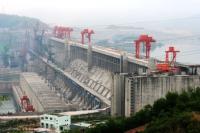Water-related conflicts set to escalate
 China's Three Gorges Dam is world's largest electricity-generating plant. Wikipedia
China's Three Gorges Dam is world's largest electricity-generating plant. Wikipedia
Finnish researcher sounds warning on global conflicts over water.
Population growth, urbanisation, increasing pollution, soil erosion and climate variations are all reflected in the management and adequacy of the world’s waters. The situation is particularly difficult in many developing countries, where there are growing concerns over escalating water crises and even outright water conflicts between countries and regions.
“The current rate of population growth and urbanization are already impacting food production. We need to improve the efficiency of agricultural output, as it’s unlikely that the acreage under cultivation can be much increased. Improved efficiency requires the efficient use of water resources,” says Professor Olli Varis from the Water and Development Research Group at Aalto University. The group’s main research interests include integrated approaches to the management and planning of water resources as well as international water issues.
Professor Varis points out that the utility of existing water resources is adversely affected by increasing industrial pollution and the breakdown of natural material circulation. The utilization of water resources, and groundwater in particular, already exceeds the renewal capacity. “Up to 60–90 percent of the world’s population live in countries that suffer from water shortages, and that figure will rise sharply in the future.”
Water for energy production
Water-related conflicts are particularly clearly visible in the Mekong River Basin in Southeast Asia. At an estimated length of almost 5,000 kilometers, the Mekong is one of the world’s largest free-flowing river systems. However, China, Laos and other countries in the region are now driving to harness these water resources, particularly for hydropower production. The Academy of Finland has contributed to finance the studies undertaken by the Water and Development Research Group on the water use situation in the Mekong River Basin.
Plans are in place to develop over 100 hydroelectric power plants along the Mekong and its tributaries. The dams would bring the riparian countries much needed income, but at the same time jeopardize many traditional water-related livelihoods. One particular concern is the loss of local fish stocks, which are a major source of income and food for millions of people, many of whom live below the poverty line.
The economic value of fisheries in the Mekong is roughly the same as that of hydroelectric power generation. The annual value of the fish catch is estimated at up to three billion US dollars,” says Marko Keskinen, whose recent doctoral thesis deals with the management of the Mekong River’s water resources. “The current plans tie in with wider issues about development and power relations. Centralized dam projects will fundamentally change the distribution of benefits derived from the river.”
According to Keskinen the development of water resources has evolved into a highly complex political issue both within and between states, with clashing interests over the different uses of water. “At the same time, water management has become increasingly integrated, which as such is a positive trend. However, the reality out in the field is extremely complex, and measures aimed at integrated water management rarely achieve their expected outcomes.”
“Many integrated approaches neglect to take into account broader philosophical and conceptual dimensions. As water management involves a number of interacting actors, it’s also always about political and personal processes. For this reason, it is also important to look at how different groups cooperate and interact, both with each other and internally.”



 del.icio.us
del.icio.us Digg
Digg












It's predicted that the next world war will be over water.
Post your comment